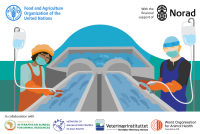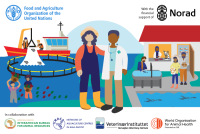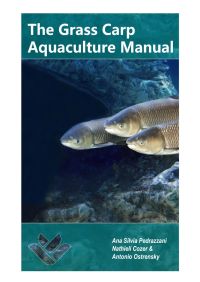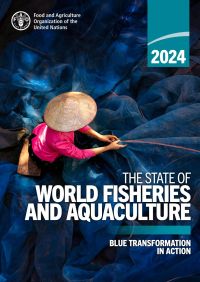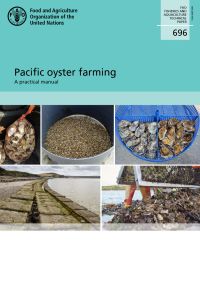This event, held jointly via Zoom or in person at FAO Headquarters in Rome, will bring together leading experts to delve into the topic of fish vaccination and new developments regarding shrimp vaccination as a vital biosecurity strategy. Current knowledge will be reviewed, examining obstacles, and uncovering opportunities for vaccine development. Bridging theory with actionable practice, the seminar aims to foster informed decision-making, discussing the potential of vaccination and addressing associated challenges. Building upon the success of the Tilapia Health webinar held in December 2021 and Tilapia health: quo vadis, this conference will be a continuation of impactful discussions, promising a dynamic and enriching experience for all participants.
Fish-Vet+ Dialogue II: One Health and Biosecurity will be held jointly via Zoom and in person at FAO Headquarters in Rome. The dialogue provides a neutral ground for continued discussions on the pressing challenges facing aquatic food systems, particularly vulnerability to diseases in the absence of robust biosecurity measures.
The hybrid event aims to foster stronger networking among key stakeholders across the aquaculture value and supply chain, including governance authorities, the private sector and academia.
This manual covers everything from grass carp's natural distribution and reproductive behaviours to its biology and anatomy. This manual also explores diseases that can affect grass carp and emphasises the crucial connection between animal welfare and stress in fish. With a detailed discussion on cultivation systems, this manual includes pond structures and fish farming techniques in both polyculture and monoculture. It provides practical insights into important aspects such as water quality monitoring, feeding, nutrition, health checks and behaviour assessments at every stage of grass carp farming – from broodstock management to pre-slaughter and slaughter processes. The emphasis is on responsible harvesting techniques, transportation considerations and humane slaughter methods. This manual offers a comprehensive guide for both novice and experienced fish farmers, and enthusiasts interested in cultivating grass carp sustainably and ensuring optimal animal welfare.
The 2024 edition of The State of World Fisheries and Aquaculture provides updated global production statistics for fisheries and aquaculture, and an outlook on future trends up to 2032 based on projections. It also highlights key policy issues, scientific and technical insights, challenges, opportunities and innovations shaping the present and future of the sector. This issue features Blue Transformation in action, illustrated by activities and initiatives, led by FAO in collaboration with Members, partners and key stakeholders, to integrate aquatic foods into global food security and sustainability, enhance policy advocacy, scientific research and capacity building, disseminate sustainable practices and technological innovations, and support community involvement.
The purpose of this manual is to give the reader a foundation of practical knowledge regarding all aspects of Pacific oyster cultivation. It is targeted at new entrants to the market wishing to establish a farm, and existing operators who wish to develop their farms and explore new cultivation techniques. The methodologies described can be applied to both low-tech, low budget, small-scale farming operations and to high-tech, big budget, industrial-scale aquaculture production enterprises. This guide focuses on the functional expertise and technical equipment required to construct and manage an operational farm in the diverse environmental and physical locations in which they can be situated, from the initial stages of finding and selecting a suitable site, to the conclusion of the first production cycle and harvesting the crop.
